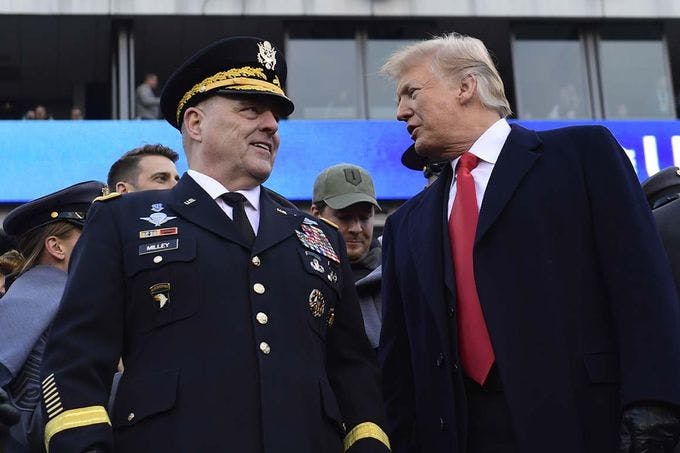Milley: Peril at the Pentagon
The idea of uniformed members of the military making foreign policy or promising to divulge attack plans is a concerning one. That is doubly true when the Pentagon appears to be acting out of fear that the President might order something, “crazy, illegal, immoral or unethical.”
by Chris Thomas

Susan Walsh, AP Photo
In Bob Woodward’s new book “Peril” the legendary Watergate reporter relates one of the most disturbing revelations about the closing days of the Trump Administration. Chairman of the Joint Chiefs of Staff Mark Milley reportedly took action to prevent then-President Trump from using nuclear weapons and gave private reassurances to the Chinese government that, in the event, an attack was ordered, he would provide a warning.
This is scary stuff. Civilian control of the military and especially nuclear weapons is a cornerstone of U.S. defense policy and there is no room for military commanders to make their own foreign policy behind the back of the administration. General Milley will go before Congress later this month to answer for his actions; the questioning is likely to be hostile, as it should be.
But it is also impossible to ignore the position in which General Milley found himself. In mid-October of 2020, intelligence showed that Beijing believed that a US strike against China might be imminent. Such a belief could justify a pre-emptive attack on the United States: the sort of thing Cold War-era nightmares are made of. Later on, as the President of the United States became increasingly and publicly disconnected from reality, the prospect of him wielding the apocalyptic power of the American nuclear arsenal weighed heavily on American allies and adversaries.
It was in this context that Milley’s oath of office and the bounds of his authority may have come into conflict. “May have” is the operative phrase here and much of what Congress will be investigating; the Department of Defense, at the direction of the Secretary of Defense, was engaged in back-channel communications with the Chinese.
In any case, the idea of uniformed members of the military making foreign policy or promising to divulge attack plans is a concerning one. That is doubly true when the Pentagon appears to be trying to forestall a preemptive attack on the United States while acting out of fear that the President might order something “crazy, illegal, immoral or unethical.”
Americans may think of General Milley as a hero who diffused a potentially catastrophic situation and, simultaneously, as a person who felt honor-bound to commit potentially criminal actions in service of his nation. Both may be true at the same time. But no matter where you stand, the Trump Presidency makes it clear that we badly need to revisit American nuclear doctrine and launch protocols so that no future military leader feels the need to take such extraordinary action.
Text CONGRESS to write to your legislators about this issue, or any other that is important to you.
Thank you to Chris E. and Tyler B.
Support the ’bot!
Upgrade to premium for AI-writing, daily front pages, a custom keyword, and tons of features for members only. Or buy one-time coins to upgrade your deliveries to fax or postal mail, or to promote campaigns you care about!
Upgrade to PremiumBuy Coins